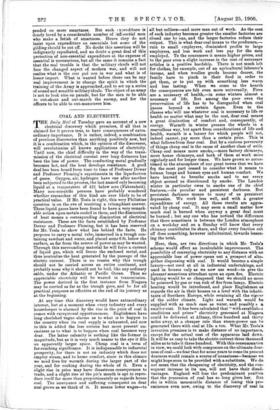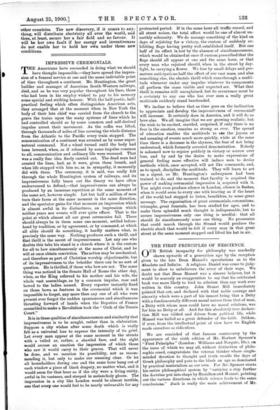COAL AND ELECTRICITY. T HE Daily Mail of Tuesday gave an
account of a new electrical discovery which promises, if all that is claimed for it proves true, to have consequences of extra- ordinary importance. It is rather, indeed, a combination of previous discoveries than anything positively new, but it is a combination which, in the opinion of the discoverer, will revolutionise all known applications of electricity. Until now, the chief difficulty in the way of the trans- mission of the electrical current over long distances has been the loss of power. The conducting metal gradually becomes hot, and the beat develops resistance. A good deal has been beard from time to time of Professor Dewar and Professor Fleming's experiments in the liquefaction of gases. Oxygen, air, hydrogen have one after another been subjected to the process, the last named only becoming liquid at a temperature of 421 below zero (Fahrenheit). Many non-scientific persons have probably wondered whether researches of this kind are ever likely to be of practical value. If Mr. Tesla is right, this very Philistine question is on the eve of receiving a triumphant answer. These liquid gases have been found to have a very remark- able action upon metals cooled in them, and the diminution of heat means a corresponding diminution of electrical resistance. These are the facts established by Professor Dewar and Professor Fleming, but it has been reserved for Mr. Tesla to show what lies behind the facts. He proposes to carry a metal tube, immersed in a trough con- taining sawdust and water, and placed some 6 ft. below the surface, as far from the source of power as may be wanted. Through this surrounding material he will force a current of liquid gas, which will freeze the enclosed metal, and thus neutralise the heat generated by the passage of the electric current. There is no reason why this trough should not be carried across an entire continent, and probably none why it should not be laid, like any ordinary cable, under the Atlantic or Pacific Ocean. Thus no appreciable electricity will be wasted in transmission. The power derived in the first instance from Niagara may be carried as far as the trough goes, and be for all practical purposes as effective at the end of its journey as at the beginning.
At any time this discovery would have extraordinary interest, but at a moment when every industry and every housekeeper is alarmed by the rise in the price of coal it comes with exceptional opportuneness. Englishmen have long cherished vague alarms as to what is to happen to the country when its coal supply is exhausted, and now to this is added the less serious but more present' un- easiness as to what is to happen when coal becomes very dear. The latter calamity is nothing like the former in magnitude, but as it is very much nearer to the eye it fills an apparently larger space. Cheap coal is a term of far-reaching significance. It is indispensable to industrial prosperity, for there is not an industry which does not employ steam, and to home comfort, since in this climate we need fires for warmth during the larger part of the year, and for cooking during the whole of it. Even a slight rise in price may have disastrous consequences to trade, and a slight rise at the pit's mouth is apt to repro- duce itself far more than proportionately as regards house coal. The 'annoyance and suffering consequent on dear coal grows as we think of it. It means lower wages—to all but colliers—and more men out of work. As the cost of each industry becomes greater the smaller factories are closed one by one, and the larger factories reduce their output. This is what dear coal means to the producers,— ruin to small employers, diminished profits to large employers, and less work and less pay for the men employed. To the consumers it means higher prices, and to the poor even a slight increase in the cost of necessary articles is a positive hardship. There is not much left for clothes, for example, out of an agricultural labourer's income, and when woollen goods become dearer, the family have to pinch in their food in order to get them, or to put up with something less warm and less lasting. When we come to the hearth the consequences are felt even more universally. Fires are a necessary of health,—in some winters almost a necessary of life. But among the poor even the preservation of life has to be disregarded when coal passes beyond a certain figure. Even to the classes who will use whatever coal is necessary to life or health no matter what may be the cost, dear coal means a great diminution of comfort and, consequently, of energy. Warmth in winter greases the wheels in a marvellous way, but apart from considerations of life and health, warmth is a luxury for which people will not, indeed cannot, pay more than a certain price. This is what follows from dear coal. But by a curious perversity of things cheap coal is the cause of another class of evils. Cheap coal means more smoke,—more factory chimneys, more house chimneys, and both of them at work more regularly and for longer times. We have grown so accus- tomed to the atmosphere of our great towns that we have fox the most part ceased to consider what it means to human lungs and human eyes and human comfort. We have learned to breathe smoke and to see every object around us discoloured by smoke. The London winter in particular owes to smoke one of its chief features,—its peculiar and persistent darkness. But persistent darkness means to many of us persistent depression. We work less well, and with a greater expenditure of energy. All these results are aggra- vated by cheap coal. It may seem a small matter how much coal is burned when anyway a great deal must be burned ; but any one who has noticed the difference that there sometimes is between the London atmosphere on a weekday and on a Sunday will know that every chimney contributes its share, and that every fraction cut off does something, however infinitesimal, towards lessen- ing the total.
Here, then, are two directions in which Mr. Tesla's scheme would effect an incalculable improvement. The possibility of conveying electricity to any distance with no appreciable loss of power opens out a prospect of alto- gether dispensing with coal. It would become a simple luxury—not used at all in industrial undertakings, and used in houses only as we now use wood—to give the pleasant sensations attendant upon an open fire. Electric lighting would be so cheapened that we should no more be poisoned by gas or run risk of fire from lamps. Electric heating would be introduced, and place Englishmen as regards the air in their houses on a level with the inhabi- tants of Southern Europe, while retaining all the vigour of the colder climate. Light and warmth would he supplied with as much ease as water, and possibly a a smaller cost. It has been calculated that "with established conditions and prices" electricity generated at Niagara could be delivered at Albany, three hundred and thirty miles away, at a cheaper rate than steam-power can be generated there with coal at 12s. a ton. What Mr. Tesla's invention promises is to make distance of no importance, except for the actual cost of the apparatus laid down. It will be as easy to take the electric current three thousand Miles as to take it three hundred. With this consummation in view, we could look with composure on the ultimate dear- ness of coal—we fear that for some years to come its present dearness would remain a source of uneasiness—because we might hope soon to be provided with a substitute. We do not mean that the cheapening of electricity, and the con- sequent increase in its use, will not have their disad- vantages. England will lose the predominant position that the possession of coal has so long given her. But she is within measurable distance of losing this pre- eminence even now, owing to the discovery of coal in
other countries. The new discovery, if it comes to any- thing, will distribute electricity all over the world, and thus, at least, secure her a fair field and no favour. It will be her own fault if her energy and inventiveness do not enable her to hold her own under these new conditions.



































 Previous page
Previous page